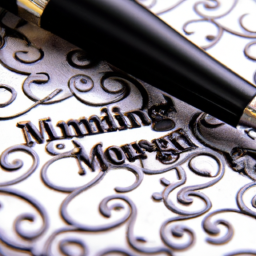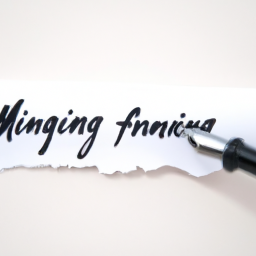Marriage is a beautiful union between two individuals, built on love, trust, and mutual understanding. However, as with any relationship, it is not immune to challenges and hardships. When cracks begin to appear in a marriage, seeking professional help through counseling is often the go-to solution. But what if there was another way to fix marriage without counseling? In this blog post, we will explore alternative methods and strategies that can help mend a troubled marriage, without the need for professional intervention. By delving into effective communication techniques, self-reflection, and proactive problem-solving, we will uncover practical steps that can potentially revive and strengthen a struggling marital bond. So, if you’re looking for ways to repair your marriage without the assistance of a counselor, read on to discover valuable insights and actionable advice.
Effective Communication Strategies to Fix Marriage Issues without Counseling
In any marriage, communication plays a vital role in building a strong and healthy relationship. However, when communication breaks down, it can lead to misunderstandings, conflicts, and ultimately, marital issues. While seeking professional counseling is often recommended, there are steps you can take to fix marriage issues without counseling. In this article, we will discuss effective communication strategies that can help you mend your marriage and improve your relationship.
Understanding the Importance of Communication
Before diving into the strategies, it is crucial to understand why communication is so crucial in a marriage. Effective communication allows couples to express their thoughts, feelings, and needs openly, fostering understanding and empathy. It helps in resolving conflicts, building trust, and strengthening the emotional bond between partners. By improving communication, you can address underlying issues, prevent misunderstandings, and create a more harmonious and fulfilling marital life.
Now, let’s explore some practical strategies that can help fix marriage issues without counseling:
1. Active Listening
One of the fundamental aspects of effective communication is active listening. This involves giving your full attention to your partner when they are speaking. Avoid interrupting or formulating your response while they are talking. Instead, focus on understanding their perspective, emotions, and concerns. Show empathy by nodding, maintaining eye contact, and providing verbal cues such as “I understand” or “Tell me more.”
When your partner finishes speaking, paraphrase what they said to ensure you understood correctly. This not only demonstrates your attentiveness but also clarifies any potential misunderstandings. Active listening helps create a safe space for open and honest communication, where both partners feel heard and valued.
2. Expressing Feelings and Needs
In a marriage, it is essential to express your feelings and needs openly. Bottling up emotions can lead to resentment and frustration, fueling conflicts. Practice expressing yourself assertively, using “I” statements to communicate how you feel without blaming or criticizing your partner. For example, instead of saying, “You never listen to me,” rephrase it as “I feel unheard when I share my thoughts.”
When discussing your needs, be clear and specific about what you require from your partner. Avoid making assumptions and expecting them to read your mind. Remember, your partner is not a mind reader, and open communication is key to meeting each other’s needs.
3. Non-Verbal Communication
While verbal communication is vital, non-verbal cues also play a significant role in understanding and expressing emotions. Pay attention to your body language, facial expressions, and tone of voice when communicating with your partner. Non-verbal cues can often convey more than words alone. Ensure your non-verbal signals align with your verbal message to avoid confusion or mixed signals.
Similarly, observe your partner’s non-verbal cues to gain a deeper understanding of their emotions. Sometimes, their body language may contradict their words, indicating hidden feelings or concerns. By being attuned to non-verbal communication, you can address underlying issues more effectively.
Conclusion
Effective communication is the cornerstone of a successful marriage. By implementing these strategies, you can work towards fixing marriage issues without counseling. Remember, it takes time and effort from both partners to improve communication and rebuild a strong foundation. Patience, empathy, and a willingness to listen and understand are key to fostering a healthier and happier marital relationship.

Practical Steps to Rekindle Love and Repair a Troubled Marriage without Professional Help
Marriage is a beautiful bond between two individuals, but it can also face challenges and difficulties. Sometimes, seeking professional help through counseling may not be a viable option for various reasons. However, there are practical steps you can take to rekindle love and repair a troubled marriage without relying on professional assistance. In this article, we will explore some effective strategies that can help you navigate through the rough patches and strengthen your relationship.
1. Open and Honest Communication
Effective communication is the foundation of any successful marriage. It is essential to create a safe and open space where both partners can express their feelings, concerns, and needs. Take the time to listen actively to your spouse without interrupting or judging. Validate their emotions and show empathy. Avoid blaming each other and instead focus on finding solutions together.
Furthermore, be honest with your partner about your own feelings and thoughts. Share your vulnerabilities and fears, as this will foster a deeper connection between you both. Remember, communication is a two-way street, so encourage your spouse to express themselves openly as well.
Lastly, practice active listening by repeating what your partner has said to ensure understanding. This will help avoid misunderstandings and show your commitment to resolving issues.
2. Prioritize Quality Time Together
In the hustle and bustle of daily life, it’s easy for couples to get caught up in their individual routines and neglect spending quality time together. However, dedicating time exclusively for each other is crucial for rekindling love and repairing a troubled marriage.
Set aside regular date nights or quality time where you can engage in activities that you both enjoy. It could be something as simple as cooking a meal together, going for a walk, or watching a movie. The key is to focus on each other and create an environment that allows for open conversation and connection.
During this dedicated time, put away distractions such as phones or work-related matters. Be fully present and attentive to your partner’s needs. By prioritizing quality time, you are showing your commitment to the relationship and creating opportunities for intimacy and emotional connection.
3. Foster Trust and Forgiveness
Trust is the cornerstone of a healthy and thriving marriage. Rebuilding trust can be a challenging process, but it is essential for repairing a troubled relationship. Both partners must be willing to work on rebuilding trust and forgiving past hurts.
Start by having open conversations about the issues that have eroded trust. Express your feelings honestly and listen to your partner’s perspective without judgment. Rebuilding trust requires consistent actions and transparency. Be reliable and follow through on your commitments. Avoid secrecy and be open about your actions and intentions.
Forgiveness is also crucial in the healing process. Holding onto grudges and resentments only perpetuates the cycle of negativity. Practice forgiveness by letting go of past hurts and focusing on the present and future. This doesn’t mean forgetting or condoning the actions that caused pain, but rather choosing to move forward and rebuild the relationship.
Remember, rebuilding trust takes time, patience, and effort from both partners. It is a gradual process, but with commitment and dedication, it is possible to restore trust and strengthen the foundation of your marriage.
In conclusion, while professional help can be beneficial, it is not always accessible or preferred for every couple. By following these practical steps, you can take control of repairing your troubled marriage without counseling. Remember to communicate openly, prioritize quality time together, and foster trust and forgiveness. Each step requires commitment and effort from both partners, but by working together, you can rekindle love and build a stronger, more resilient marriage.

Alternative Approaches to Healing and Strengthening Your Marriage without Resorting to Counseling
In every marriage, there may come a time when you feel like your relationship is on shaky ground. While counseling can be beneficial for many couples, it is not the only solution. If you are looking for alternative approaches to fixing your marriage without counseling, there are several steps you can take to heal and strengthen your relationship. By focusing on open communication, self-reflection, and personal growth, you can work towards rebuilding the foundation of your marriage.
1. Cultivate Open and Honest Communication
One of the most crucial aspects of fixing a marriage without counseling is to establish and maintain open and honest communication. Effective communication is the key to resolving conflicts, understanding each other’s needs, and building trust. Here are some steps you can take:
Listen actively: Practice active listening by giving your full attention to your partner when they are speaking. Avoid interrupting or planning your response in your mind. Instead, focus on truly understanding their perspective.
Express your feelings: Share your emotions and thoughts with your partner in a calm and respectful manner. Use “I” statements to avoid blaming or criticizing your spouse. For example, instead of saying, “You always ignore me,” say, “I feel ignored when we don’t spend quality time together.”
Practice empathy: Try to put yourself in your partner’s shoes and understand their point of view. Show empathy and validate their feelings even if you disagree. This can help create a safe space for open and honest communication.
By cultivating open and honest communication, you can strengthen the foundation of your marriage and work towards resolving conflicts in a healthy manner.
2. Engage in Self-Reflection and Personal Growth
Fixing a marriage without counseling also involves self-reflection and personal growth. It is essential to take a step back and evaluate your own actions, behaviors, and contributions to the problems in your marriage. Here are some steps to facilitate self-reflection:
Identify patterns: Reflect on recurring patterns or negative behaviors that may be contributing to the issues in your marriage. This could include poor communication habits, lack of emotional support, or neglecting your partner’s needs.
Take responsibility: Acknowledge your role in the problems and take responsibility for your actions. Avoid playing the blame game and instead focus on how you can make positive changes.
Seek personal growth: Engage in activities that promote personal growth, such as reading self-help books, attending workshops or seminars, or seeking guidance from mentors. This can help you develop new skills and perspectives that can positively impact your marriage.
Self-reflection and personal growth can lead to increased self-awareness, which in turn can contribute to a healthier and more fulfilling marriage.
3. Prioritize Quality Time and Intimacy
In the midst of busy lives and daily responsibilities, it is easy for couples to neglect quality time and intimacy. However, nurturing your emotional and physical connection is vital for fixing your marriage without counseling. Here are some steps to prioritize quality time and intimacy:
Schedule regular date nights: Set aside dedicated time for just the two of you. Plan activities that you both enjoy and use this time to reconnect and strengthen your bond.
Communicate your needs: Talk openly with your partner about your emotional and physical needs. Discuss what makes you feel loved and desired, and find ways to meet each other’s needs.
Be affectionate: Show physical affection regularly, such as hugging, kissing, or holding hands. Small gestures of love and affection can go a long way in maintaining intimacy.
Prioritizing quality time and intimacy can help reignite the spark in your marriage and foster a deeper connection with your partner.
In conclusion, fixing a marriage without counseling is possible by implementing alternative approaches. By cultivating open and honest communication, engaging in self-reflection and personal growth, and prioritizing quality time and intimacy, you can work towards healing and strengthening your relationship. Remember, it takes effort, patience, and a genuine commitment from both partners to make positive changes and rebuild a happy and fulfilling marriage.
Let’s recap
Marriages go through ups and downs, and sometimes they hit a rough patch that may seem irreparable. While seeking professional counseling is a popular option, there are alternative ways to fix a marriage without the need for therapy. Communication is key in any relationship, and taking the time to have open and honest conversations with your partner can be a powerful tool in resolving conflicts. By actively listening and expressing your feelings without blame or judgment, you can create a safe space for both partners to share their perspectives and work towards finding common ground.
Another effective strategy to mend a troubled marriage is to focus on self-improvement. Often, when individuals work on themselves and address their own issues, it can positively impact the relationship as a whole. Taking responsibility for one’s actions, practicing self-reflection, and seeking personal growth can lead to a more understanding and compassionate partnership. Additionally, finding ways to reignite the spark and reconnect as a couple is crucial. Planning regular date nights, engaging in shared hobbies, or trying new experiences together can help rekindle the romance and strengthen the bond between spouses.
While counseling can be immensely helpful, it is not the only solution to fix a struggling marriage. By prioritizing effective communication, personal growth, and reconnecting as a couple, it is possible to repair and strengthen the relationship without professional intervention. Remember, every marriage is unique, and finding the right approach that works for both partners is essential in overcoming challenges and building a lasting, fulfilling partnership.
Here are some questions from our readers:
Q1: Is it possible to fix a marriage without counseling?
A1: Yes, it is possible to fix a marriage without counseling. While professional counseling can be beneficial, there are alternative approaches that can help improve a troubled marriage. It’s important to remember that every marriage is unique, and what works for one couple may not work for another.
Q2: What are some steps to fix a marriage without counseling?
A2: There are several steps you can take to work on your marriage without counseling. Firstly, open and honest communication is crucial. Take the time to listen to your partner’s concerns and express your own feelings without judgment. Secondly, make an effort to spend quality time together and prioritize your relationship. This can involve going on dates, engaging in shared hobbies, or simply having meaningful conversations. Lastly, consider seeking guidance from self-help books, online resources, or workshops that focus on improving relationships.
Q3: Can self-help books really help fix a marriage?
A3: Yes, self-help books can be a valuable resource in fixing a marriage. They provide guidance, insights, and practical strategies to address common marital issues. These books often offer different perspectives and techniques that can help couples navigate challenges and develop healthier communication patterns. While they may not be a substitute for professional counseling, self-help books can be a great starting point for couples looking to improve their marriage on their own.
Q4: How important is forgiveness in fixing a marriage without counseling?
A4: Forgiveness plays a vital role in fixing a marriage without counseling. Holding onto grudges and resentment can create a toxic environment and hinder progress. It is essential for both partners to acknowledge their mistakes, take responsibility, and genuinely apologize. Forgiveness allows couples to let go of past hurts and move forward with a renewed sense of trust and understanding. However, forgiveness is a process that takes time and effort from both individuals involved.
Q5: What if our efforts to fix the marriage without counseling are not successful?
A5: If your efforts to fix your marriage without counseling are not yielding the desired results, it may be beneficial to consider professional help. Marriage counselors are trained to provide unbiased guidance, facilitate effective communication, and offer strategies tailored to your specific situation. Seeking counseling does not mean you have failed; rather, it shows your commitment to improving your relationship. Remember, it’s never too late to seek help and work towards a healthier and happier marriage.

About Sarah:
Sarah is a certified marriage counselor and co-founder of SaveOurVows.com. Her expertise lies in helping couples reignite the spark in their relationships and create a lasting bond built on trust and understanding. As a devoted wife and mother, Sarah draws from her personal experiences and professional training to offer valuable guidance to couples seeking to save their marriages. Her articles focus on nurturing emotional connection and fostering a supportive environment where love can thrive.
About John:
John is a relationship expert and co-founder of SaveOurVows.com. With a Master’s degree in Marriage and Family Therapy, John is passionate about helping couples navigate the challenges that come with marriage. Having experienced the highs and lows in his own relationship with Sarah, he understands the complexities of married life and believes in the power of effective communication and emotional intimacy. John’s articles offer practical tips and insights to empower couples in their journey to a stronger and more fulfilling marriage.
Together as a Team:
John and Sarah’s mission is to provide a compassionate and supportive platform for couples in need of guidance and encouragement. Through their collaborative efforts, they aim to inspire love and commitment in marriages worldwide. As a couple themselves, they embody the principles they teach, and their dedication to helping others strengthen their relationships is the driving force behind SaveOurVows.com.
Favorite Topics:
Rekindling Romance: John and Sarah believe that rekindling the romance is an essential aspect of any successful marriage. Their articles on this topic offer creative ideas and practical strategies to keep the passion alive.
Effective Communication: Communication is the foundation of a healthy relationship. John and Sarah share expert tips to improve communication between couples and resolve conflicts constructively.
Building Trust: Trust is paramount in any marriage. Through their articles, they help couples rebuild trust and create a secure and loving environment.
Join Sarah and John’s Journey:
Sarah and John invite you to join them on their journey of empowering couples to save their vows and build lasting and fulfilling marriages. Their insights and advice aim to make a positive impact on your relationship, fostering a bond that stands the test of time.





